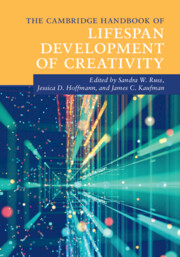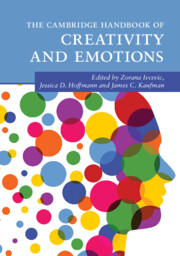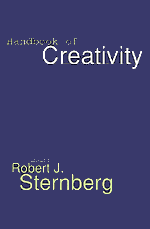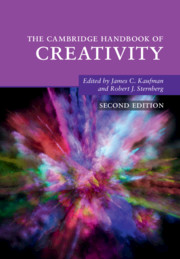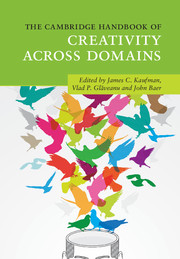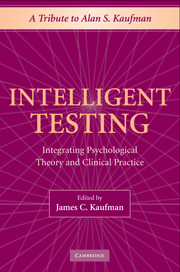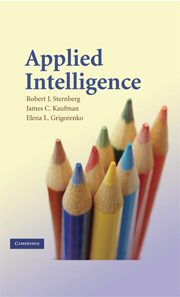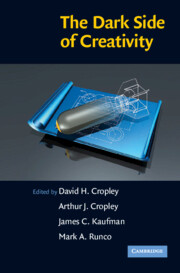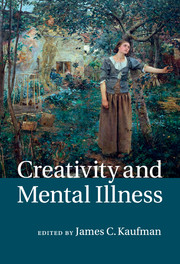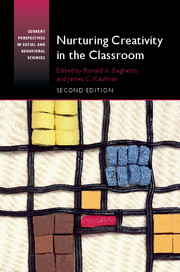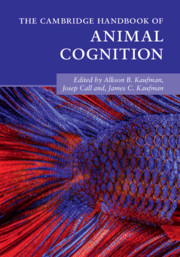The Cambridge Handbook of Lifespan Development of Creativity
£51.99
Part of Cambridge Handbooks in Psychology
- Editors:
- Sandra W. Russ, Case Western Reserve University, Ohio
- Jessica D. Hoffmann, Yale University, Connecticut
- James C. Kaufman, University of Connecticut
- Date Published: November 2021
- availability: Available
- format: Paperback
- isbn: 9781108719186
£
51.99
Paperback
Other available formats:
Hardback, eBook
Looking for an inspection copy?
This title is not currently available on inspection
-
This handbook focuses on the development and nurturance of creativity across the lifespan, from early childhood to adolescence, adulthood, and later life. It answers the question: how can we help individuals turn their creative potential into achievement? Each chapter examines various contexts in which creativity exists, including school, workplace, community spaces, and family life. It covers various modalities for fostering creativity such as play, storytelling, explicit training procedures, shifting of attitudes about creative capacity, and many others. The authors review research findings across disciplines, encompassing the work of psychologists, educators, neuroscientists, and creators themselves, to describe the best practices for fostering creativity at each stage of development.
Read more- Focuses on the interplay of creativity and lifespan development
- Authored by interdisciplinary experts on the fields of creativity, human development, and their intersection from across the globe
- Integrates information about contexts and culture across locations, such as school and the home, as well as modalities including play, writing, and more.
Reviews & endorsements
'The perspectives on creative development are diverse and comprehensive, providing insights into how creativity can change throughout one's life. I found important implications for both my personal and professional lives in every single chapter. This handbook will be the seminal work on creative development for years to come.' Jonathan Plucker, Julian C. Stanley Professor of Talent Development, Johns Hopkins University, USA
See more reviews'This wonderful book brings together leading scientific experts in the field, and addresses creativity from preschool to adulthood. Topics range from children's play, to neurodevelopmental disorders, to cultural differences in China, to videogames. It is a valuable resource for anyone interested in how creativity develops over the lifespan.' Keith Sawyer, Morgan Distinguished Professor in Educational Innovations, University of North Carolina at Chapel Hill, USA
'The ideas of how creativity is developed over the lifespan is explored by an outstanding assembly of creativity researchers. This handbook will become the gold standard of scholarship in this critical area of research for educators, psychologists, and anyone else interested in how we think creatively.' Jeffrey K. Smith, Professor of Education and Dean, University of Otago, New Zealand
'Anyone who has children, teaches children, studies children, or just wonders about how creativity develops will want to have this book. This volume covers the literature on the development of creativity, the editors are leaders in the field, and the authors are top-notch. I recommend the book most highly.' Robert J. Sternberg, Professor of Human Development, Cornell University, USA, and Honorary Professor of Psychology, University of Heidelberg, Germany
'Although it is a first-rate reference work, this volume could easily be used as a class textbook, either stand-alone or with other texts. It is a marvelous complement to Kaufman's earlier Cambridge Handbook of Creativity, edited with Robert Sternberg; the Cambridge Handbook of the Neuroscience of Creativity, edited by Rex Jung and Oshin Vartanian … Recommendation: Essential.' S. T. Schroth, Choice Reviews
Customer reviews
Not yet reviewed
Be the first to review
Review was not posted due to profanity
×Product details
- Date Published: November 2021
- format: Paperback
- isbn: 9781108719186
- length: 750 pages
- dimensions: 255 x 178 x 32 mm
- weight: 1.25kg
- availability: Available
Table of Contents
Introduction Sandra W. Russ, Jessica D. Hoffmann, and James C. Kaufman
Part I. Core Concepts of Lifespan Creativity Development:
1. Basic Concepts of Creativity Hansika Kapoor and James C. Kaufman
2. The Creative Brain: A Developmental Snapshot Oshin Vartanian
3. Pretend Play: A Microcosm of Creativity Sandra W. Russ
4. Lifespan Development of Creativity Marc Bornstein
Part II. The Development of Creativity:
5. Are Preschoolers Creative? A Review of the Literature Natalie S. Evans, Molly A. Schlesinger, Emily J. Hopkins, Garrett J. Jaeger, Robert Michnick Golinkoff, and Kathy Hirsh-Pasek
6. Development of Creativity in School-age Children Alexis W. Lee and Sandra W. Russ
7. The Development and Enhancement of Adolescent Creativity Jessica D. Hoffmann and Elinor Hills
8. The Intertwined Development of Identity and Creativity: Immersing in the Digital Self Baptiste Barbot
9. Creative Development in Children from a Measurement Perspective Dimitrios Zbainos and Todd Lubart
10. Creativity in Adulthood Maciej Karwowski and Ewa Wiśniewska
11. The Many Faces of Creativity in Old Age Eva Kahana, Boaz Kahana, and Polina Ermoshkina
Part III. Modes of Enhancement:
12. Domain Specific Talent Development John Baer
13. Enhancement of Creativity across Lifespan in Mainland China: Theoretical Inquiries and Practical Examples in the New Millennium Weiping Hu, Xinru Zhang, and Min Tang
14. Beyond Flights of Fancy? The Relations Between Children's Imaginary Companions, Creativity, and Coping Naomi Aguiar and Marjorie Taylor
15. Creating Imaginary Worlds Across the Lifespan Michele Root-Bernstein
16. Imaginative Creativity in the Writing and Reading of Stories Keith Oatley
17. The Effects of Video Games on Creativity: A Systematic Review Seyedahmad Rahimi and Valerie Shute
Part IV. Environments and Contexts:
18. Creative Identity Development in Classrooms Ronald Beghetto
19. The Creativity in Children's Museums Garrett Jaeger and Helen Hadani
20. Makers and Makerspaces: Developing Inventive Talent Barbara A. Kerr and Isaac Gardner
21. Organizations and Creativity Roni Reiter-Palmon and Chelsa Dredge
22. Creativity Development and Culture Izabela Lebuda, Vlad Petre Glăveanu, and Dorota M. Jankowska
Part V. Special Populations:
23. The Development of Gifted and Talented Students' Creativity in School Contexts Rena F. Subotnik, Paula Olszewski-Kubilius, and Frank C. Worrell
24. Creative Play in Children with Neurodevelopmental Disorders: Assessment, Intervention, and Future Directions Ellen A. Doernberg and Anastasia Dimitropoulos
25. Eminent Creators: Early Experiences and Adult Achievement Dean Keith Simonton
Epilogue: What Have We Learned? Sandra W. Russ, Jessica D. Hoffmann, and James C. Kaufman.
Sorry, this resource is locked
Please register or sign in to request access. If you are having problems accessing these resources please email [email protected]
Register Sign in» Proceed
You are now leaving the Cambridge University Press website. Your eBook purchase and download will be completed by our partner www.ebooks.com. Please see the permission section of the www.ebooks.com catalogue page for details of the print & copy limits on our eBooks.
Continue ×Are you sure you want to delete your account?
This cannot be undone.
Thank you for your feedback which will help us improve our service.
If you requested a response, we will make sure to get back to you shortly.
×
